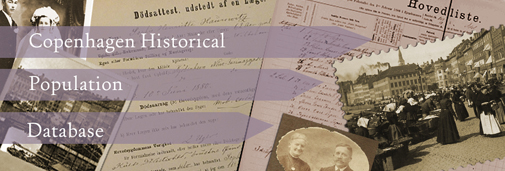The Copenhagen Historical Population Database, 1880-1885: socio-economic status and lifecourse in the city
BioHistory Seminar presentation by Barbara Ana Revuelta Eugercios, Mobilex Fellow at BioHistory Group and Copenhagen Centre for Health Research in the Humanities (CoRe) at the Saxo Institute, April 30th 2015, 12.00-13.30, in room 12.3.07. All interested are welcome.
Analyzing 'hard lives'
The effect of industrialization and urbanization on the lives of poor residents in 19th century cities is still a heated topic for debate and Copenhagen is no exemption to the rule, in spite of the richness of individual level data collected at that time.
The wealth of contemporary accounts and data published at the time has has given us many insights on what was thought and seen in the past but we still only have a broad, static, and general image of how the working classes lived and died.
The poor as an aggregate class seemed to have a very hard life but we still only have little first-hand information on how these “hard lives” were lived and led to early deaths at the level of particular individuals.
The widespread availability of data on the individuals living in the city in the form of census sheets, vital registration and other sources nowadays allows us to descend to the analyses of these lives, which are the focus on this talk.
Copenhagen Historical Population Database
The stratification of individuals in the city (and its measurement) and its consequence for people’s life courses (fertility, infant mortality and marriage) will be the focus of this talk which will make use of the Copenhagen Historical Population Database (CHPD), which is currently being developed in order to reconstruct the lives and deaths of all residents in Copenhagen between 1880 and 1885, studying their most important life events:
- birth,
- marriage,
- childbearing,
- migration,
- death,
- etc.
The Copenhagen Population Database is part of the project “A tale of two cities: inequality in death in Copenhagen and Madrid in late 19th and early 20th century” led by Barbara Revuelta Eugercios. The project is financed by the Danish Council for Independent Research and FP7 Marie Curie Actions- COFUND.
